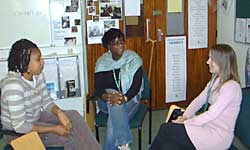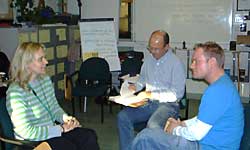Being a Counsellor
Becoming a Counsellor: Counsellor Training
Before actually entering Counselling Training it is usual for students to take a series of Counselling Skills Courses. Such courses are designed to assist participants in gaining primary counselling skills and developing a basic understanding of the philosophy which underpins counselling practice.
A Counselling Skills Qualification will be an asset in its own right to anyone professionally engaged in inter-personal work, or for anyone who is interested in intrapersonal development. At this level of study students are usually introduced to the various approaches to counselling used in the UK today, which broadly are:
- person-centred
- humanistic
- cognitive / cognitive behavioural
- psychodynamic
For anyone thinking of training to become a counsellor it is important to gain insight into the various counselling approaches; because each approach has a unique way of working with clients which suits different practitioners. Understanding the basic philosophy and theory which underpins the various approaches will help you to choose which approach to counselling it is best for you to study.
 |  | |
| Working in Triads | ||
Entry to Counsellor Training
The British Association for Counselling and Psychotherapy (BACP), recommend that in order to practise as a counsellor you need to complete the following training:
- an introductory short course — a counselling 'taster', which outlines the theory, skills and practice behind counselling (usually studied part-time, over 10 to 12 weeks)
- a certificate in counselling — a solid introduction to counselling theory, the use of counselling skills, self-awareness and the influence of issues, such as gender and ethnicity in the counselling relationship (normally a one-year, part-time course of 100 to 170 hours)
- a diploma or advanced diploma in counselling — an in-depth study and supervised practice, which will often meet the training requirement for accreditation with a professional body like the BACP (usually a two- or three-year, part-time course, of around 400 hours). BCAP Website
During a diploma level course participants need to find a counselling placement within a Counselling Agency. Many students gain this training experience in areas such Bereavement, Education, Drugs & Alcohol Counselling and Youth Counselling.
Whilst many awarding bodies, including CSCT, CPCAB, NCFE, City and Guilds, ABC and Edexcel (BTEC), have developed counselling courses it is wise to ensure that any course you take appears on the National Qualifications Framework. Professional Associations, such as the BACP and United Kingdom Council for Psychotherapy (UKCP) also additionally accredit some Counsellor Training Courses at Diploma Level. Again it is wise to check that any diploma course you apply to join is accredited by either the BACP or the UKCP.
The BACP Advises: ‘Due to the range of counselling courses available it is important that you check the value of the award being offered, with the course provider, a professional association or potential employer’. BCAP Website
For details of the Counselling Courses Offered at LC&CTA see Counselling Courses
Counselling; Being a Counsellor and a Counsellor’s Work
A counsellor provides a safe non-judgemental space for clients to talk freely about their life concerns and personal issues. Through listening and encouraging clients to explore their individual situation in greater depth, a counsellor enables his/her clients to reduce their inner confusion or worry and increase their self-understanding.
A counsellor does not give advice or provide a client with any direct solutions to a problem, but facilitates the development of a client’s self-awareness and sense of self, which results in the client being able to choose their own best way forward with greater self-insight.
The work of a counsellor is focused on building empathic relationships which promote equality, respect and trust. Such relationships help clients to discuss concerns and events with the counsellor that may be impossible to disclose to family members or friends. A counsellor must have integrity, be honest and open and be able to keep boundaries and confidentiality. Counselling is only ever undertaken on the request and with the consent of a client, never without it.
There is no clear distinction between Counselling and Psychotherapy and both activities are known as ‘Talking Therapies’. Counsellors work in many different settings such as colleges or schools, voluntary agencies, the NHS or Private Practice. The severity of clients’ concerns may vary and counsellors work in different fields for example, bereavement and loss, marriage guidance, substance or sexual abuse.
Whilst counsellors may work with a client during a period of her/his personal development, counsellors are more likely to be working with vulnerable people in periods of crisis or deep distress.
Practising counsellors regularly attend ongoing supervision with a trained and registered supervisory counsellor in order to enhance their practice, protect their clients and assure their personal wellbeing as a practitioner.
The work and qualities of a Counsellor in brief summary
Through building a therapeutic relationship the counsellor facilitates clients to:
- Examine the behaviour, thoughts, feelings and/or circumstances which led the individual to attend counselling in the first place.
- Explore their personal options, make decisions rooted in greater self-awareness and bring about positive life enhancing change.
The counsellor must have the ability to:
- Understand, respect and value a client’s beliefs and experiences.
- Believe in the client’s capacity to find their own best solutions.
- Empathise well and have highly developed communication skills.
- Be open to developing their own personal awareness and be able to work with developmental feedback; personal and professional.
- Be open to exploring his/her client work honestly during the supervision process.
On-going professional Development
Qualified counsellors usually work toward Professional Association Accreditation and the BACP has an Individual Counsellor Accreditation Scheme. In order to become an Accredited BACP Member you need to meet the following criteria:
- you must have completed 450 hours of formal training in counselling (on a BACP accredited diploma course or other substantial counselling course) and
- a minimum of 450 hours' supervised counselling practice with clients, over a period of not less than three years and no more than six years — 150 hours' practice must have been achieved after your diploma level course was completed. BCAP Website
As an ethical practitioner and member of a professional association, a counsellor needs to continue developing her/his skills and knowledge. Most counsellors do this by attending short courses, seminars or workshops.